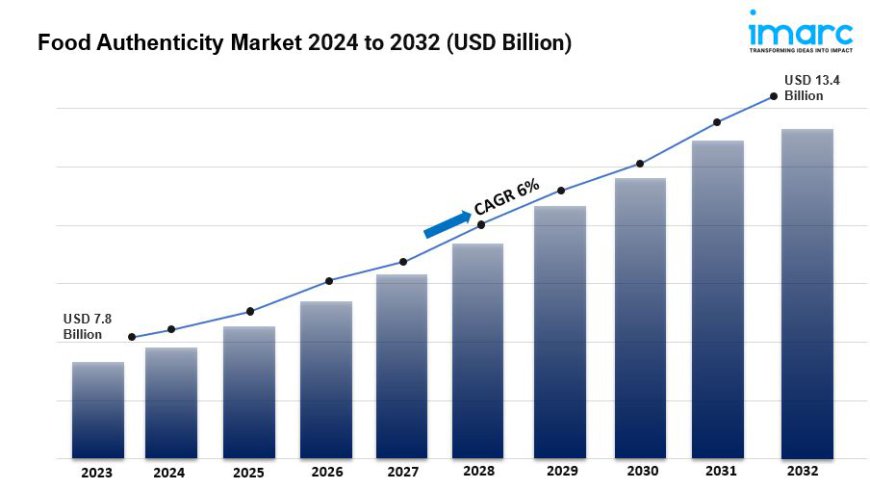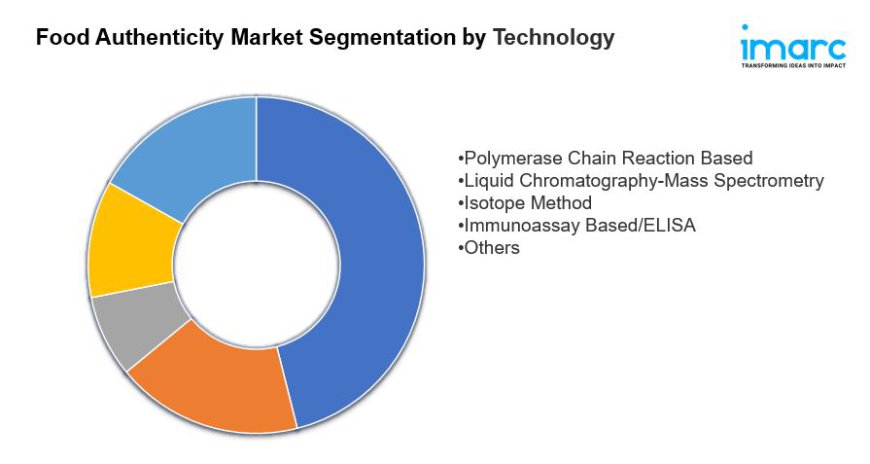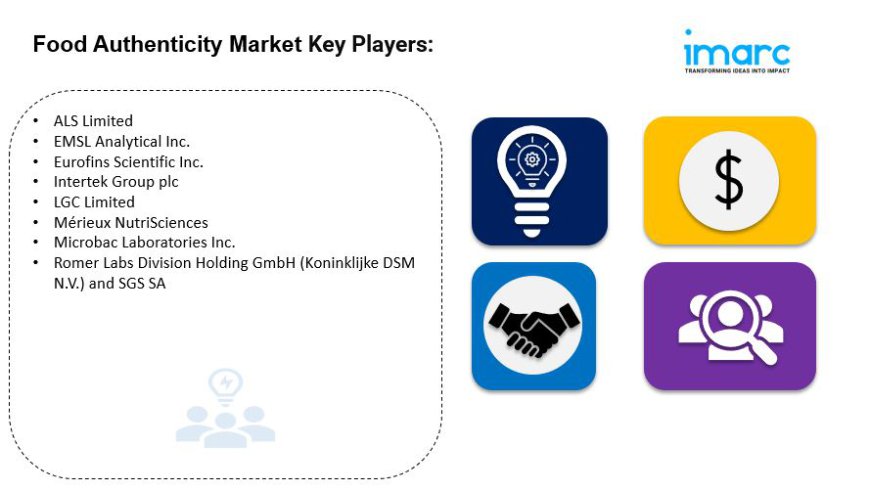Food Authenticity Market Size Growth & Trends Analysis Report 2032
The global food authenticity market size reached US$ 7.8 Billion in 2023. Looking forward, IMARC Group expects the market to reach US$ 13.4 Billion by 2032, exhibiting a growth rate (CAGR) of 6% during 2024-2032.

Food Authenticity Market 2024-2032:
- The global food authenticity market size reached US$ 7.8 Billion in 2023.
- The market is expected to reach US$ 13.4 Billion by 2032, exhibiting a growth rate (CAGR) of 6% during 2024-2032.
- Region-wise, the market has been divided into North America (United States and Canada), Asia Pacific (China, Japan, India, South Korea, Australia, Indonesia, and others), Europe (Germany, France, the United Kingdom, Italy, Spain, Russia, and others), Latin America (Brazil, Mexico, and others), and the Middle East and Africa.
- Based on the target testing, the market has been classified into meat speciation, country of origin and aging, adulteration test, and false labelling.
- On the basis of technology, the market has been divided into polymerase chain reaction based, liquid chromatography-mass spectrometry, isotope method, immunoassay based/ELISA, and others.
- Based on the food tested, the market has been categorized into meat and meat product, dairy and dairy product, cereal, grain, and pulse, processed food, and others.
- The growing focus of consumers for transparency in food products is a primary driver of the food authenticity market.
- Technological advancements and the introduction of next-generation sequencing (NGS), mass spectrometry, and blockchain is reshaping the food authenticity market size.

Industry Trends and Drivers:
- Increasing Consumer Awareness About Food Authenticity:
The rising consumer awareness about food quality, authenticity, and safety, is one of the major factors boosting the food authenticity market growth. Moreover, the growing efforts among consumers to know more about the origins and content of their food, with a focus on avoiding counterfeit or misrepresented products, is catalyzing the market growth. Besides this, the increasing health-consciousness among buyers, leading to the demand for products that are organic, non-genetically modified organisms (GMO), and free from harmful additives, is supporting the market growth. Additionally, the rising role of documentaries, reports, and social media in spotlighting food fraud issues, such as diluted honey and mislabeled seafood, is catalyzing the market growth.
- Imposition of Stringent Regulatory Standards:
The food authenticity market trends highlight that the implementation of various standards by global regulatory bodies is driving the market growth. Moreover, the increasing focus on high food standards and regulations to mitigate food fraud risks, thus ensuring that ingredients match labels and are safe for consumption, is fueling the market growth. Along with this, the growing need among companies for compliance as they face hefty penalties for non-compliance, prompting them to prioritize food authenticity testing as a core part of their operations, is contributing to the market growth. Additionally, the heightened need for traceability, propelling producers, and distributors to provide clear records from farm to table is enhancing the food authenticity market share.
- Rapid Advancements in Testing Technologies:
The rapid advancements in testing technologies, making verification faster, more accurate, and more accessible, are boosting the market growth. Besides this, the introduction of techniques like deoxyribonucleic acid (DNA) sequencing, spectrometry, and chromatography to detect fraud with precision is anticipated to drive the market growth. Apart from this, the increasing innovations in portable testing devices that enable on-the-spot verification, particularly beneficial in supply chain management, are strengthening the market growth. Besides this, the introduction of blockchain technology for traceability, as it complements these advancements by securely recording product details and verifying authenticity, is contributing to the food authenticity market size.
Request for a sample copy of this report: https://www.imarcgroup.com/food-authenticity-market/requestsample
Food Authenticity Market Report Segmentation:
Breakup By Target Testing:
- Meat Speciation
- Country of Origin and Aging
- Adulteration Test
- False Labelling
Based on target testing, the market is classified into meat speciation, country of origin and aging, adulteration test, and false labeling.
Breakup By Technology:
- Polymerase Chain Reaction Based
- Liquid Chromatography-Mass Spectrometry
- Isotope Method
- Immunoassay Based/ELISA
- Others
On the basis of technology, the market is segregated into polymerase chain reaction-based, liquid chromatography-mass spectrometry, isotope method, immunoassay-based/ELISA, and others.

Breakup By Food Tested:
- Meat and Meat Product
- Dairy and Dairy Product
- Cereal, Grain, and Pulse
- Processed Food
- Others
Based on the food tested, the market is categorized into meat and meat products, dairy and dairy products, cereal, grain and pulses, processed food, and others.
Breakup By Region:
- North America (United States, Canada)
- Asia Pacific (China, Japan, India, South Korea, Australia, Indonesia, Others)
- Europe (Germany, France, United Kingdom, Italy, Spain, Russia, Others)
- Latin America (Brazil, Mexico, Others)
- Middle East and Africa
On a regional basis, the market is North America (the United States and Canada); Europe (Germany, France, the United Kingdom, Italy, Spain, Russia, and others); Asia Pacific (China, Japan, India, South Korea, Australia, Indonesia, and others); Latin America (Brazil, Mexico, and others); and the Middle East and Africa.
Top Food Authenticity Market Leaders:
The food authenticity market research report outlines a detailed analysis of the competitive landscape, offering in-depth profiles of major companies.
Some of the key players in the market are:
- ALS Limited
- EMSL Analytical Inc.
- Eurofins Scientific Inc.
- Intertek Group plc
- LGC Limited
- Mérieux NutriSciences
- Microbac Laboratories Inc.
- Romer Labs Division Holding GmbH (Koninklijke DSM N.V.) and SGS SA

Ask An Analyst: https://www.imarcgroup.com/request?type=report&id=4228&flag=C
If you require any specific information that is not covered currently within the scope of the report, we will provide the same as a part of the customization.
About Us:
IMARC Group is a global management consulting firm that helps the world’s most ambitious changemakers to create a lasting impact. The company provide a comprehensive suite of market entry and expansion services. IMARC offerings include thorough market assessment, feasibility studies, company incorporation assistance, factory setup support, regulatory approvals and licensing navigation, branding, marketing and sales strategies, competitive landscape and benchmarking analyses, pricing and cost research, and procurement research.
Contact us:
IMARC Group
134 N 4th St. Brooklyn, NY 11249, USA
Email: sales@imarcgroup.com
Tel No:(D) +91 120 433 0800
United States: +1-631-791-1145

 jamessmithjimmy12
jamessmithjimmy12